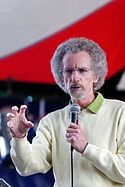Philip Yancey Quote
Harvard biologist Edward O. Wilson performed a rather bizarre experiment on ants that may supplement Paul’s illustration (Rom 6:1-14). After noticing that it took ants a few days to recognize one of their crumpled nestmates as having died, he determined that ants identified death by clues of smell, not visually. As the ant’s body began to decompose, other ants would infallibly carry it out of the nest to a refuse pile. After many tries, Wilson narrowed down the precise chemical clue to oleic acid. If the ants smelled oleic acid, they would carry out the corpse; any other smell, they ignored. Their instinct was so strong that if Wilson daubed oleic acid on bits of paper, other ants would dutifully carry the paper to the ant cemetery. In a final twist, Wilson painted oleic acid on the bodies of living ants. Sure enough, their nestmates seized them and marched them, their legs and antennae wriggling in protest, out to the ant cemetery. Thus deposited, the indignant 'living dead' cleaned themselves off before returning to the nest. If they did not remove every trace of the oleic acid, the nestmates would promptly seize them again and return them to the cemetery. They had to be certifiably alive, judged solely by smell, before being accepted back into the nest.I think of that image, 'dead' ants acting very much alive, when I read Paul’s first illustration in Romans 6. Sin may be dead, but it stubbornly wriggles back to life.
Harvard biologist Edward O. Wilson performed a rather bizarre experiment on ants that may supplement Paul’s illustration (Rom 6:1-14). After noticing that it took ants a few days to recognize one of their crumpled nestmates as having died, he determined that ants identified death by clues of smell, not visually. As the ant’s body began to decompose, other ants would infallibly carry it out of the nest to a refuse pile. After many tries, Wilson narrowed down the precise chemical clue to oleic acid. If the ants smelled oleic acid, they would carry out the corpse; any other smell, they ignored. Their instinct was so strong that if Wilson daubed oleic acid on bits of paper, other ants would dutifully carry the paper to the ant cemetery. In a final twist, Wilson painted oleic acid on the bodies of living ants. Sure enough, their nestmates seized them and marched them, their legs and antennae wriggling in protest, out to the ant cemetery. Thus deposited, the indignant 'living dead' cleaned themselves off before returning to the nest. If they did not remove every trace of the oleic acid, the nestmates would promptly seize them again and return them to the cemetery. They had to be certifiably alive, judged solely by smell, before being accepted back into the nest.I think of that image, 'dead' ants acting very much alive, when I read Paul’s first illustration in Romans 6. Sin may be dead, but it stubbornly wriggles back to life.
Related Quotes
About Philip Yancey
